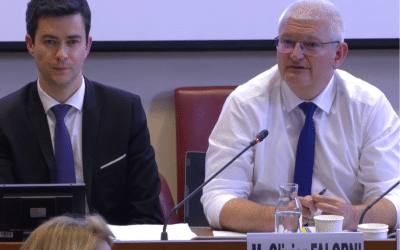At a time when France is considering legalising euthanasia and assisted suicide, Alliance VITA, together with IEB (Institut Européen de Bioéthique – European Bioethics Institute) and the citizens’ network Vivre dans la Dignité (Living with dignity), organised a meeting on 28th February at the Maison de la Chimie with some ten experts from Belgium, Canada, Switzerland, and Holland, as well as a testimony by an American for an international symposium on the end of life. Each of them explained the impact of euthanasia or assisted suicide in their home state.
The legalisation of euthanasia or assisted suicide has taken place in each of those states on the basis of a triple promise, whose credibility was evaluated by the international symposium:
- Euthanasia and assisted suicide are authorised only in exceptional circumstances,
- The accompaniment of the most vulnerable or those at their end of life will not be affected,
- This new “individual right”, which will not take anything away from anyone, will have no consequences on the others.
The compared experience was able to confirm, through three legal, medical and social round tables, the extent to which these promises cannot be held.
Although the legal frameworks vary from one state to another, the participants from Holland, Belgium, Switzerland, the United States and Canada, all reported the inevitable relaxation of their eligibility criteria. Everywhere, the framework initially established for exceptional cases has been relaxed.
According to Léopold Vanbellingen, a doctor of law from Belgium, in charge of research at the European Bioethics Institute, “The logic of subjectivity and non-discrimination, at the basis of the legalisation of euthanasia, very quickly led to an extension to cases which would have been quite unthinkable when the law was submitted to the vote.”
Trudo Lemmens, a Canadian professor of law and health policies, stated that in Canada, “The legalisation of Medical Assistance in Dying (MAiD) for exceptional cases at the end of life has since drifted towards a virtually universal therapy for sometimes vague suffering associated with sickness and handicap.”
In Holland, the number of euthanasia has increased by a factor of five since 2002 and at least 20 percent of the diseases claimed in order to qualify for euthanasia now concern patients who are not in any terminal phase: dementia, psychiatric disorders, polypathologies associated with old age, handicap, etc.
The same trend can be observed in Switzerland where the conditions for qualifying for assisted suicide have gradually been extended, such that the overall suicide rate has doubled over a few years.
For carers, the introduction of euthanasia and assisted suicide has an impact not only on palliative care at the end of life, but also on the accompaniment of those suffering with suicidal tendencies.
Johannes Irsiegler, a psychiatrist and psychotherapist, reported that in Switzerland any person in distress who considers that life is not worth living can find a network to facilitate resorting to suicide.
Catherine Dopchie, a doctor in palliative care in Belgium, noted, with witness accounts, that in care homes, euthanasia has become a “right” for residents and a duty imposed on doctors.
In Belgium, euthanasia has become an option among others in the planning of healthcare.
In Canada, a mere 30 to 50% of Canadians have access to any proper form of palliative care, and very few, perhaps 15%, have access to specialised palliative care for the treatment of more complex problems, as explained by Leonie Herx, a palliative care doctor.
Finally, far from being a mere new right which does not remove anything from anyone, the practises of euthanasia and assisted suicide, represent a fundamental change to society. Steve Bobillier, a Swiss doctor of philosophy and social science and ethicist stated that suicide is not an individual act, but it has a consequent impact on close relations, carers and society as a whole. Through the mimetic suicide effect (a phenomenon which has been widely documented over the years by research workers), the legislation covering assisted suicide leads to its becoming dangerously commonplace at the detriment of its prevention.
In the words of Theo Boer, professor of healthcare ethics in Holland, who supported the law in his state before becoming disillusioned: “Euthanasia has an impact far beyond the 6 % of Dutch people who end their life through euthanasia. The vision which we all bear on old age, fragility, dependence on care and the very notion of humanity has changed. Even those who die of natural causes consider the choice of euthanasia since it is available.”
Tugdual Derville, the spokesperson for Alliance VITA summarised “The precious warnings given to France by the experts from the states concerned: against any naivety regarding the unavoidable impact on society as a whole caused by the ending of the prohibition to kill, the so-called freedom to die which is in fact liberticidal.”
He concluded the symposium with the following statement:
“When the accelerated death of those who have become dependent, diseased or aged is put forward as a solution, an advantage, a form of despair is inevitably insinuated in people’s minds regarding vulnerability. The first victims of such despair are the most fragile, those threatened with suicide – in all its forms – and euthanasia.”
The press file for the symposium and the videos of the speakers are available on Rencontre internationale fin de vie (End of life International symposium)



